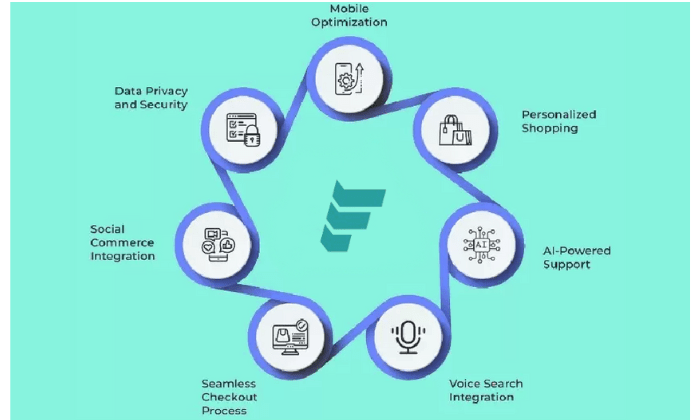Key E-commerce Integrations to Drive Sales in 2025
E-commerce has become a pivotal part of the global economy, and as the industry grows, so do the opportunities to enhance online shopping experiences. For retailers, staying competitive means adopting cutting-edge integrations that streamline operations, improve customer experience, and ultimately boost sales. In 2025, integrating the right technologies can provide the foundation for growth, scalability, and efficiency, key factors that will set successful e-commerce businesses apart from the rest.
From automation tools to advanced analytics, the integrations you choose can make all the difference. Highlighting key e-commerce integrations set to drive sales in 2025, these technologies are transforming retail operations and enhancing how customers interact with online stores.
1. AI-Driven Customer Support for Personalized Experiences
Customer service has long been a cornerstone of e-commerce success, and AI-powered chatbots are becoming a game changer. In 2025, advanced chatbots go beyond answering basic queries. They can provide tailored recommendations, handle returns, and even predict customer needs based on browsing behavior and past interactions.
This integration allows businesses to offer 24/7 support without needing a human presence at all times, reducing response times and enhancing customer satisfaction. With AI, you can create personalized interactions that make customers feel valued, which leads to higher conversion rates and customer retention.
2. Seamless Omnichannel Selling Through Unified Platforms
As consumers interact with brands across multiple platforms social media, mobile apps, and in store, it’s crucial to have an omnichannel selling strategy. In 2025, integrating centralized commerce platforms helps retailers manage inventory, sales, and customer interactions across all touchpoints.
For example, imagine a customer browsing products on their mobile app and later purchasing via desktop everything needs to be synced. Unified platforms enable you to track customer behavior, centralize inventory management, and provide consistent experiences across all channels. This integration maximizes reach and ensures no sales opportunity is missed.
3. Real Time Inventory Management with Cloud Based Systems
Efficient inventory management is critical to avoid stockouts and overstocking. In 2025, cloud based inventory management systems are transforming how businesses keep track of stock levels. These platforms allow for real time tracking and automatic restocking based on demand fluctuations.
Imagine you run a small online store that fulfills orders both locally and globally. A cloud based system can sync your warehouse and distribution center, ensuring that stock levels are always accurate. This reduces the risk of missed sales due to items being out of stock and improves the customer experience with faster shipping times.
4. Advanced Payment Gateways for Seamless Transactions
Payment processes can either make or break an online purchase experience. In 2025, advanced payment gateways are becoming more sophisticated, offering multiple payment options and secure transactions. Integrations like Buy Now, Pay Later (BNPL) and cryptocurrency payments give customers more flexibility in how they pay.
By offering diverse payment methods, you not only increase conversion rates but also cater to different customer preferences, whether it’s a quick credit card payment or spreading costs over time. These integrations ensure that customers feel confident making purchases without delays or additional steps.
5. AI-Driven Personalization Tools for Targeted Marketing
Effective marketing today isn’t about broadcasting to a wide audience, it’s about targeting the right people with the right message. In 2025, AI-driven personalization tools can analyze vast amounts of customer data to create highly targeted campaigns.
These tools use machine learning algorithms to understand customer behavior, predict future preferences, and deliver customized content through email, social media, and other channels. For example, a customer who frequently purchases fitness gear can be targeted with tailored promotions for new products based on their browsing history. This personalized marketing approach drives engagement, conversions, and brand loyalty.
6. Sustainable Logistics Integrations for Eco-Conscious Customers
In 2025, sustainability is no longer just a selling point, it’s a must have feature for e-commerce brands. Consumers are increasingly choosing brands that demonstrate eco-friendly practices in shipping and logistics. Integrating green logistics solutions helps businesses reduce carbon footprints, optimize shipping routes, and choose eco-friendly packaging.
These integrations not only align with customer values but also improve brand reputation. By offering transparent shipping options and showcasing sustainability efforts on product pages, businesses can attract environmentally conscious shoppers and differentiate themselves from competitors.
7. Cloud-Based Analytics for Actionable Insights
Data-driven decision making is essential for e-commerce success, and cloud based analytics platforms allow businesses to access real time insights from every aspect of their operations, sales, customer behavior, and marketing campaigns.
These platforms provide actionable data that can help businesses track performance, identify trends, and optimize strategies. For instance, you can analyze where your customers are coming from, which products are trending, and even predict future sales cycles. With cloud analytics, you can make data backed decisions to enhance conversions and maximize profitability.
Conclusion: Stay Ahead with E-commerce Integrations in 2025
As e-commerce continues to evolve, embracing the right integrations will help your business adapt to changing consumer expectations and drive sustainable growth. From AI-driven personalization to cloud-based inventory management, the technologies available today are more advanced than ever. By integrating these tools, you can streamline operations, enhance customer experiences, and ultimately boost sales.
Staying competitive in 2025 means investing in e-commerce integrations that streamline processes, enhance customer satisfaction, and boost conversions. By leveraging the right technology, your online store can meet market demands and ensure long-term success. Contact Frontlevels for expert insights and guidance to navigate challenges and unlock new growth opportunities!

